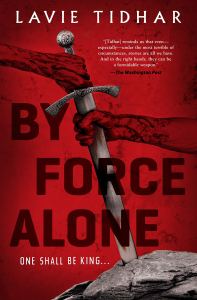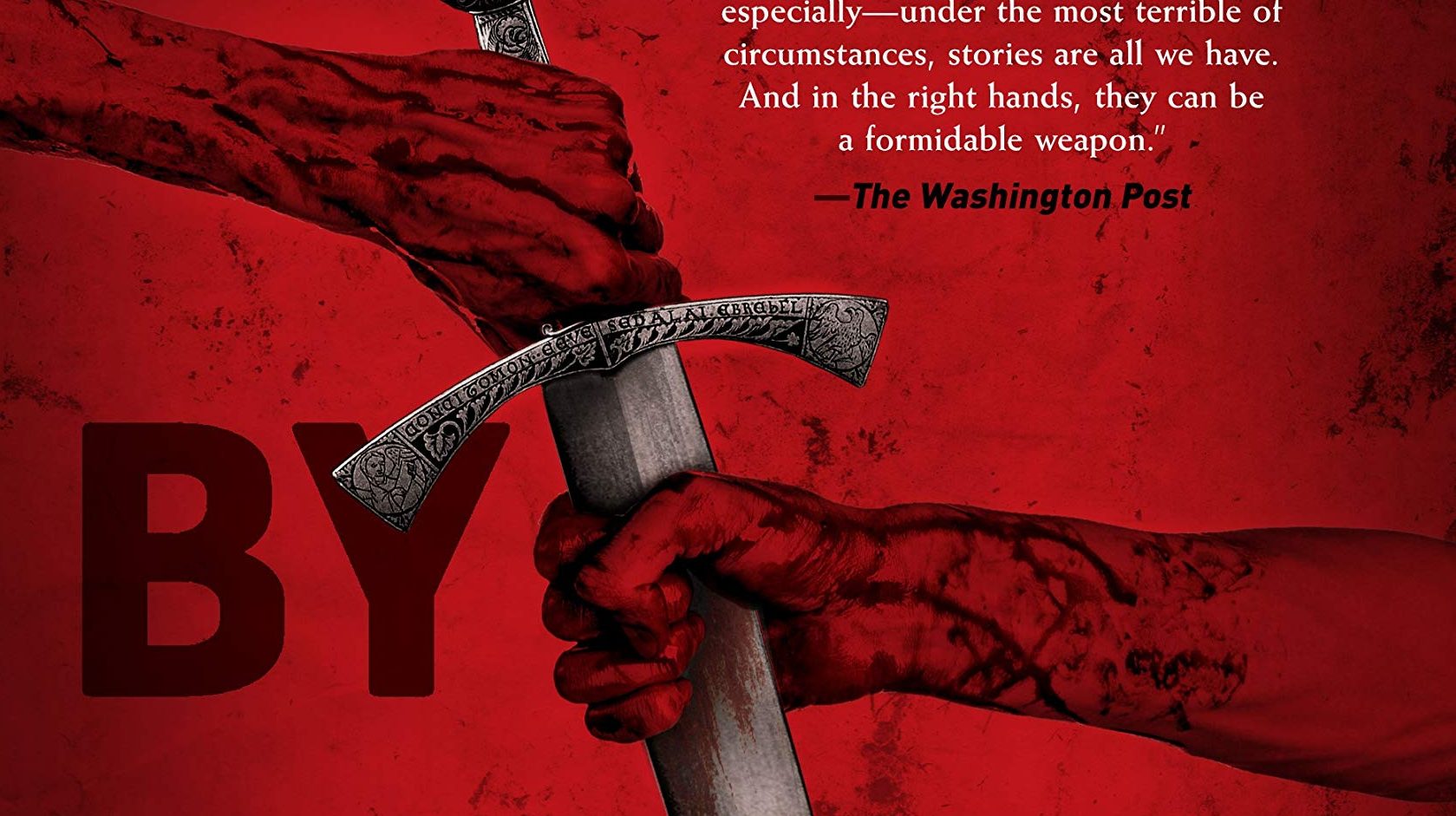This post is sponsored by 
When Lavie Tidhar set out to write his own Arthurian legend, he wanted to cut through the nationalistic myth-making into the bone of the original stories.
“It’s supposed to be about chivalry and honor, and it’s . . . it’s not!” He told Clarkesworld. “Everyone else was doing the story the way we’re told it goes, not the way it actually goes.”
The way it goes, in Tidhar’s By Force Alone, is as a bloody, bawdy gangster story where heroes are con men and England isn’t worth fighting for. Some of the ideas he uses appear in the original myth, while others give new context to familiar characters. (Some sources mark Arthur as a Welsh folk hero, arguably not English at all, although he has become symbolic of it in international eyes.) The idea of Arthur’s return to usher in a golden age for England is still a familiar cultural touchstone, layered with irony, context and mystery that have also been part of the story from nearly the beginning.
The earliest of the scattered retellings, which Tidhar described as “sort of like a shared world fan fiction project,” puts the darkness up front. In Geoffrey of Monmouth’s Historia Regum Britanniae, often considered the first organized narrative of the elements that would become the King Arthur and Holy Grail story, Arthur’s father Uther rapes Igerna in disguise as her husband. She goes on to be Arthur’s mother. A dark retelling can’t do much darker than that, but By Force Alone puts the darkness up front to make a fast-paced, grim, sometimes humorous version peppered with pop culture.
“Arthur’s too dumb to be afraid of anything,” another character thinks during the future king’s childhood. Tidhar’s Arthur is barbaric, lacks introspection, and follows in the footsteps of both his fathers (Uther and the pimp Hector). People in the world of the novel revere knights because they’re powerful, with the best weapons and the best access to equipment and food. But the word is also always equivalent with mobster, with kings as bosses. Tidhar tosses “an offer you couldn’t refuse” in there for fun, one of the many rapid fire pop culture references Tidhar describes as “‘equipoise’..a condition of being a 21st Century writer.” Camelot becomes a paradise of vice, its cornerstone a brothel.
By Force Alone’s Merlin is an irreverent Lovecraftian vampire with a foul mouth and grumpy disposition. Instead of a kindly, gray-bearded old man, he’s an ageless boy impatient for the story to get to the good parts, and his weird relationship with Arthur was one of the most fun parts of the novel. Whatever Merlin’s true nature is — it isn’t quite clear, which is also fun — he feeds off power like a sponge soaks up water. Other characters get grim, creative makeovers. Guinevere is a Robin Hood-esque bandit happy to play for the winning side, who marries Arthur in a drugged haze. Lancelot nudges the book toward the wuxia genre as a Jewish kung fu master.

So, what’s the theme in all this? The title tells it. Characters are driven by a lot of base needs — greed, hunger, lust — but power rules above all. Even the treatment of fantasy reflects this theme. A fairy land exists, but humans made it with their own dreams, and it’s just as perverse as the natural world. Leprechauns and stranger creatures inhabit the story but fall sway to power just like anything else. In a particularly striking subversion, leprechauns exist but their gold is real ore mined by enslaved leprechauns.
And that power is never an inherently English thing. Tidhar comments on English nationalism by saying, over and over, that it’s a derivation of the ancient Greek and Roman empires that laid the groundwork, with nothing in Arthur’s time to set it apart. What remains of the island’s best infrastructure is all on a Roman model that gives the novel a post-apocalyptic flavor of chaotic gangs roaming around after the fall of civilization. King Arthur, who fights the Romans in some version of the story, here claws out an empire in a land they no longer care to rule. Yet nor can it be interpreted as shifting the patriotism onto the Romans, who receive their own share of scathing epithets.
As the blurb says, a sword is just a sword: dirty, lethal, mundane and profane. The dirt and gore and sex repeat in a messy slurry that questions whether any of it is disgusting or fascinating or both. Certainly, little in this story is noble — this is also repeated over and over again, until the appearance of Arthur’s rival Mordred shows how closely (and yet how far away, tonally) By Force Alone adheres to its inspirations. Shock value and gross-out humor are as much a part of the novel as political commentary, backed by a nihilistic realism too tongue-in-cheek and self-indulgent to become truly grim.
This humor is evident in the way Tidhar knows exactly what this book is intended to be. “And then of course one early rejection was that people don’t want this version of Arthur!” he told Clarkesworld. “They want the “comfort and nostalgia of the original tales”! Which cracked me up! So much so that I worked that line into the book.” By Force Alone is an utter rejection of comfort and nostalgia that nevertheless invites a train wreck fascination—but never suggests that this thing we’re watching, this tried-back and dirtied-up version of patriotism, is sole recipient of any moral good. It will not produce pride or comfort, unless what you’re looking for is the pride of the conman on a successful job, or the comfort felt by a bully on a schoolyard the size of an empire. These are the forces in the title, which is a refrain throughout the book insisting that power is the natural law that matters the most to the story’s environment.
Meanwhile, Tidhar’s prose is anything but brutish. The word choice is what makes the train wreck so fascinating and fast-paced. Heavy but never slow, short sentences and snappy wit keep the book moving. A power fantasy that pushes both words to their limits, By Force Alone adds a sharp, obscene new take to the Arthurian genre.
